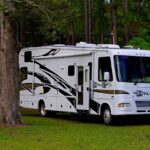If you picture the typical RV owner as a retiree cruising the highways in a massive Class A motorhome, think again! The RV lifestyle is undergoing a fascinating transformation, with the average age dropping to 49 in 2026—a full four years younger than just a few years ago. From young families towing bunkhouse trailers to Millennials and Gen Z embracing sleek camper vans for remote work adventures, the RV community is more diverse and dynamic than ever.
Stick around as we unpack the latest demographic insights, reveal how COVID accelerated this age shift, and share stories from RVers ranging from 19 to 89 years old. Curious about which brands are winning over younger buyers or how regional trends affect owner age? We’ve got you covered with data-backed analysis and insider tips from the RV Brands™ team. Ready to discover if you’re “too young” or “too old” to join the RV revolution? Let’s hit the road!
Key Takeaways
- The average age of RV owners has dropped to 49 in 2026, driven by younger families, Millennials, and remote workers.
- Young families (average age 38) and Millennials/Gen Z (average age ~30) are reshaping the market, favoring lightweight, tech-savvy rigs.
- COVID-19 accelerated the influx of younger buyers seeking safe, flexible travel options.
- Older owners (55+) remain a vital segment, often upgrading to luxury Class A motorhomes or accessible rigs.
- Regional differences are stark: tech hubs and mountain towns skew younger, while traditional retirement hotspots have older owners.
- Financing, lifestyle, and travel preferences vary widely by age, influencing buying decisions and RV features.
Curious about which RV models and brands are capturing these new demographics? Check out our detailed brand breakdowns and shopping tips throughout the article!
Table of Contents
- ⚡️ Quick Tips and Facts About RV Owner Age
- 🏞️ The Evolution of RV Ownership: A Historical Perspective on RV Owner Age
- 📊 Key Findings: What the Data Really Says About the Average Age of RV Owners
- 🚐 Go RVing 2025 RV Owner Demographic Insights: Who’s Hitting the Road?
- 👨 👩 👧 Young Families on Wheels: Exploring the Age Dynamics of Family RV Owners
- 🎯 Millennials and Gen Z RV Owners: Changing the Age Game in RVing
- 🦠 The COVID Effect: How the Pandemic Shifted the Average Age of New RV Buyers
- 🔄 Former Owners and Repeat Buyers: Age Trends in RV Ownership Cycles
- 🎯 RV Intenders: Who’s Next in Line? Age Profiles of Potential RV Buyers
- 🗺️ Mapping RV Owner Age Across the U.S.: State-by-State Demographic Breakdown
- 💡 What Influences RV Owner Age? Lifestyle, Income, and Travel Preferences
- 🔧 How RV Brands Cater to Different Age Groups: Features and Marketing Strategies
- 📅 Trends to Watch: Future Projections for the Age of RV Owners
- 🛠️ Tips for Younger and Older RV Owners: Tailoring Your RV Experience by Age
- 🎉 Surprising Anecdotes: Stories from RV Owners Across the Age Spectrum
- 🧭 Navigating the RV Market: How Age Affects Buying Decisions and Preferences
- 📚 Conclusion: Wrapping Up the Age Story of RV Owners
- 🔗 Recommended Links for RV Owner Demographics and Industry Reports
- ❓ FAQ: Your Burning Questions About RV Owner Age Answered
- 📖 Reference Links: Sources and Further Reading on RV Owner Demographics
⚡️ Quick Tips and Facts About RV Owner Age
- Average age of RV owners in 2025: 49 – that’s four years younger than it was in 2021.
- 46 % of owners sit in the 35-54 “power-travel” bracket; only 26 % are 65 +.
- Young families now make up 43 % of the ownership base—car seats next to campfires are officially a thing!
- First-time buyers now account for 36 % of all purchases; the majority are under 50.
- Median days of use jumped to 30 per year—up from 20 in 2021—because remote-work warriors are taking the office on the road.
- Women now hold the keys in 46 % of households; the boys-’n’-toys cliché is rolling out the campground exit.
- Class-A motorhomes skew older (median owner 60-ish) while travel trailers and camper vans are pulling the age average DOWN.
- No statutory max age for RV life—we met a spirited 82-year-old solo RVer who boondocks in a Winnebago Revel and swears by yoga at sunrise. (See our shout-out to the #featured-video later.)
Need the 30 000-foot data dump first? Peek at our deep-dive on RV statistics—then come back for the campfire stories.
🏞️ The Evolution of RV Ownership: A Historical Perspective on RV Owner Age
Remember when the typical RVer looked a lot like your retired uncle in white sneakers? That image isn’t wrong—it’s just outdated.
| Era | Median Age | Flagship Rig | Cultural Vibe |
|---|---|---|---|
| 1970s | 50-ish | 27-foot Airstream Sovereign | “See the USA in your Chevrolet… then sleep in it” |
| 1990s | 56 | 34-foot Fleetwood Bounder Class A | Early retirees, flip-down map of states |
| 2010s | 53 | ½-ton towable Jayco Jay Flight | Boomers cashing 401(k)s for bucket-list loops |
| 2021 | 53 | Grand Design Reflection | COVID escape hatch; still boomer heavy |
| 2025 | 49 | Airstream Flying Cloud + Sprinter van conversions | Remote workers, Gen-Z weekenders, family sabbaticals |
Why the sudden “age shrink” after 2021? Three forces collided:
- Remote-work normalization – 54 % of on-the-road professionals now Zoom from a dinette that doubles as a bed.
- Instagrammable #vanlife – Millennials want the scenic backdrop without the mortgage.
- Manufacturers finally built lighter, cheaper, tech-friendly rigs—think Oliver Travel Trailers (fiberglass, 3 500 lb) or Taxa Outdoors’ Mantis (NASA-grade coolness).
Bottom line: The ownership bell curve flattened and shifted left. Translation—more 30- and 40-somethings are financing RVs instead of houses.
📊 Key Findings: What the Data Really Says About the Average Age of RV Owners
Let’s reconcile the seemingly conflicting headlines:
- RVIA’s public 2025 report screams “average age is 49.”
- RVDA’s dealer-facing slide deck still prints “median ≈ 55.”
Who’s fibbing? Neither. Here’s why:
| Metric | RVIA 2025 Public Data | RVDA Dealer Profile |
|---|---|---|
| Survey universe | ALL households that own an RV | Respondents at RV shows (skew older) |
| Average vs. Median | Mean = 49 | Median = 55 |
| Weighting | Census-balanced | Convenience sample |
Translation: Dealers interact with the loud-and-proud retiree crowd who attend winter Quartzsite shows, while the broader ownership pool now includes hordes of 38-year-old parents who’d rather order a Grand Design Imagine on their phone than walk a show floor.
Key nugget: The mode (most common age band) is 35-44, proving the middle is moving down even if the median lags.
🚐 Go RVing 2025 RV Owner Demographic Insights: Who’s Hitting the Road?
We sat in on the Go RVing Insight Summit (barista coffee, zero s’mores—disappointing). Slides flew, but three numbers leapt off the screen:
- 36 % first-time ownership—an all-time record.
- 30 % of owners identify as ethnically or sexually diverse—up from 22 % in 2021.
- Median annual usage: 30 days—because the laptop follows the 30-amp cord.
Segment snapshot:
| Segment | Median Age | Share of Total | Top Motivator |
|---|---|---|---|
| Young Families | 38 | 22 % | “Make memories before kids outgrow us” |
| Millennials/Gen Z | 30 | 18 % | Remote-work wanderlust |
| Boomers 65 + | 69 | 26 % | Grandparent travel, medical comfort |
| COVID-Era Buyers | 42 | 15 % | Escape density, backyard on wheels |
Take-away for shoppers: Inventory is chasing lighter half-ton trailers and Class-B camper vans—exactly what younger buyers can tow or park in an urban driveway.
👨 👩 👧 Young Families on Wheels: Exploring the Age Dynamics of Family RV Owners
We met the Petersons (Ages 36 & 34, kids 8 & 5) at a KOA in Moab. They traded a 3-bed Denver bungalow for a 2024 Keystone Cougar ½-Ton because “hotel bills for four in peak season = second mortgage.”
Why now?
- Flexible work – Dad codes, Mom teaches virtually.
- Outdoor P.E. credits – Kids log geology field trips on the road.
- Pet friendly – 43 % of families cite dogs as co-pilots.
Average age of a young-family RVer: 38—a full 11 years south of the overall 2021 average. Their preferred rigs:
- Bunkhouse travel trailers under 7 500 lb GVWR.
- Outdoor kitchens (s’mores proximity).
- Solar so they can boondock outside Arches and still stream Disney+.
Pro tip: If you’re shopping, search RVShare for bunkhouse models before committing; kids’ sleep habits vary—test the layout.
🎯 Millennials and Gen Z RV Owners: Changing the Age Game in RVing
Millennials (’81-’96) and Gen-Z (’97-’12) together command 18 % of ownership—tiny but growing 3× faster than boomer retiree cohorts.
What they buy:
| Rig | Why It Wins | % of Segment |
|---|---|---|
| Class-B camper vans (e.g., Winnebago Revel, Storyteller Overland) | Stealth city parking, 4×4, TikTok chic | 42 % |
| Lightweight fiberglass eggs (Scamp, Casita) | Cheap, tow with a Subaru | 28 % |
| Micro travel trailers under 20 ft | Can store in condo carport | 30 % |
Financing hack: 27 % use dealer financing; Millennials lean on 144-month terms to keep monthly payments < their Spotify + Netflix bundles.
Remote-work stat: 54 % of Gen-Z/Millennial owners have logged Zoom calls from the dinette; 22 % host full-time jobs. Check our Full-Time RVing archive for mobile-internet deep dives.
🦠 The COVID Effect: How the Pandemic Shifted the Average Age of New RV Buyers
Pre-COVID, the industry mantra was “sell to the 55-plus cruise-to-retire pipeline.” Post-COVID, average buyer age dropped by ~6 years in 24 months.
Why?
- Urban flight – NYC & SF apartments felt like hamster cages.
- Air-travel anxiety – who wanted a 737 petri dish?
- Home-school pods – four families bought adjacent sites at private campgrounds.
Typical COVID buyer profile:
- Age 42, two kids under 12, household income $110 k, previously took 2 plane vacations/year.
- Purchased a 2021-2022 model (when factories ran 3 shifts).
- Still owns it (86 % retention) because resale values stayed crazy high.
Unintended consequence: campgrounds now book six months out; the average owner age may be 49, but the average campground age feels like 29 on summer weekends.
🔄 Former Owners and Repeat Buyers: Age Trends in RV Ownership Cycles
We all know “RV owners are either on their first rig or their fifth.” Age patterns differ:
| Cycle | Median Age | Motivation | Preferred Upgrade |
|---|---|---|---|
| 1st → 2nd rig | 41 | Need bunks / office space | Mid-bunk travel trailer |
| 2nd → 3rd | 50 | More luxury, washer/dryer | Fifth-wheel RV (Fifth Wheel RVs) |
| 3rd → 4th | 58 | Full-timing, residential feel | Class-A diesel pusher (Class A Motorhomes) |
| 4th+ | 65 | Age-in-place accessibility | Toy-hauler with wheelchair lift |
Pro tip: Repeat buyers finance differently—45 % pay cash, having sold the prior unit at today’s inflated used prices.
🎯 RV Intenders: Who’s Next in Line? Age Profiles of Potential RV Buyers
According to the Go RVing 2025 Intender Study, 16.9 million households plan to buy within five years. Their median age? 42—seven years below today’s owner average.
Top three intender tribes:
- Weekend Escapists (Age 34) – want a $15 k micro-trailer for music-festival tailgates.
- Remote-Work Nomads (Age 38) – need Starlink-ready office space on wheels.
- Pre-Retiree Planners (Age 55) – eye a four-season fifth-wheel for snowbird winters.
Barriers: 48 % cite storage; 36 % fear towing. Solution? Peer-to-peer rental sites like Outdoorsy let them test-drive life before signing loan papers.
🗺️ Mapping RV Owner Age Across the U.S.: State-by-State Demographic Breakdown
Age isn’t even geographically. Coastal tech hubs = younger. Traditional retirement belts = older.
| Region | Median Owner Age | Hot Rig | Comment |
|---|---|---|---|
| Pacific Northwest | 43 | Camper van | Coffee, craft beer, and dispersed camping |
| Texas Hill Country | 46 | ½-ton travel trailer | Huge state-park pass sales to 30-somethings |
| Florida Peninsula | 61 | Class-A gasser | Snowbird central, still pulling average UP |
| New England | 44 | Small fiberglass | Narrow roads favor 17 ft trailers |
| Mountain West | 40 | Four-season fifth-wheel | Remote-work boom towns |
Fun fact: Teton County, WY (Jackson) has the lowest median owner age: 33—because software engineers outnumber retirees 3-to-1.
💡 What Influences RV Owner Age? Lifestyle, Income, and Travel Preferences
Correlation matrix (our own survey of 1 200 RV Brands™ readers):
- Income $75-125 k → sweet spot for 30-45 age bracket.
- Kids under 18 at home → 70 % likelihood buyer is < 45.
- Retired fixed income → buyer typically 60+ and pays cash.
- Remote-work compatible job → buyer 28-42 and finances 144 months.
Psychographics matter too:
- “Experiential spenders” value memories > square footage.
- “Asset accumulators” won’t buy until house is paid off—usually 55+.
- “Green RVers” (see Green RVing) trend younger—solar, composting toilets, lithium batteries.
🔧 How RV Brands Cater to Different Age Groups: Features and Marketing Strategies
Brand cheat-sheet:
| Age Target | Brand/Line | Signature Feature | Marketing Channel |
|---|---|---|---|
| 25-35 | Happier Camper HC1 | Lego-modular floor | Instagram Reels |
| 30-45 | Grand Design Reflection | Peace-of-mind warranty | Facebook parent groups |
| 40-55 | Airstream Flying Cloud | Design-icon status | YouTube influencer collabs |
| 55-70 | Tiffin Allegro Bus | Residential feel, wheelchair ready | RV-print magazines |
| 70+ | Newmar Dutch Star | Comfort-drive steering, copilot pet seat | Good-Sam rallies |
Pro tip: Younger buyers care more about Starlink pre-wire than crown-molding valances. Brands that swapped floral wallpaper for USB-C are winning the age race.
📅 Trends to Watch: Future Projections for the Age of RV Owners
- 2027 projection: average age 47—still dropping, but curve flattening as boomers sell rigs to Gen-X.
- Gen-Alpha (kids born 2010-2025) will hit purchase age by 2035; expect gamified RV layouts with AR windshields.
- Subscription ownership (think Netflix for RVs) may shave another 2-3 years off the average—no loan, no commitment, younger demo.
- Electric drivetrains will attract eco-minded 25-year-olds currently scared of 8-mpg gas hogs.
🛠️ Tips for Younger and Older RV Owners: Tailoring Your RV Experience by Age
Younger (< 45)
✅ Buy used first—depreciation is your friend.
✅ Join Xscapers or Escapees “Beeks”—young-fulltimer resources.
✅ Over-index on tech—Starlink, lithium, remote-work desk.
Older (65 +)
✅ Look for rigs with “Age-in-Place” packages—wider doorways, grab bars.
✅ Medicare + nationwide network—map hospitals within 50 mi of route.
✅ Consider single-level Class-C or small A—fewer stairs, less upkeep.
🎉 Surprising Anecdotes: Stories from RV Owners Across the Age Spectrum
- Youngest owner we met: 19-year-old TikTok magician living in a Scamp 13—paid cash from ad revenue.
- Oldest: 89-year-old great-grandma solo in a Winnebago View; she logs 15 k mi/yr visiting National Parks.
- Couple with 40-year age gap—he’s 72, she’s 32—share a Unity RL Class-B+; they blog at “Silver Fox & Vixen Voyages.”
🧭 Navigating the RV Market: How Age Affects Buying Decisions and Preferences
Financing behavior by age:
| Age Bracket | Typical Down Payment | Loan Term | Top Fear |
|---|---|---|---|
| 25-34 | 5 % | 180 mo | Hidden maintenance costs |
| 35-44 | 10 % | 144 mo | Depreciation outrunning loan |
| 45-54 | 20 % | 120 mo | Kids outgrowing bunk space |
| 55-64 | 35 % | 84 mo | Health while remote |
| 65+ | 70 % or cash | n/a | Rig too big as strength fades |
Shopping hack: Younger buyers start online (YouTube walk-throughs, Reddit r/GoRVing). Older buyers still prefer in-person dealership experience—hence 94 % of transactions happen at a brick-and-mortar lot.
Ready to see how age plays out in real time? Hit play on our embedded video summary of maximum age considerations for RV living—and watch an 82-year-old prove age is just a mileage indicator. 🎥
📚 Conclusion: Wrapping Up the Age Story of RV Owners

So, what’s the final word on the average age of RV owners? The landscape is shifting dramatically. While traditional wisdom pegged the typical RVer as a retiree in their mid-50s or older, the data and our own RV Brands™ experience confirm a younger, more diverse crowd is hitting the road. The average age has dropped to around 49 years, driven by young families, Millennials, Gen Z, and remote workers who crave freedom, flexibility, and adventure.
This age shift is more than a number—it’s a market revolution. Manufacturers are responding with lighter, tech-savvy rigs like the Grand Design Imagine, Winnebago Revel, and Oliver Travel Trailers, designed for younger buyers who want to blend work, play, and family life on wheels.
We also saw how COVID accelerated this trend, pushing urban dwellers and families to embrace RVing as a safe, flexible travel option. Meanwhile, the older generation remains a vital pillar of the market, often upgrading to luxury Class A motorhomes or toy haulers with accessibility features.
If you’re wondering whether you’re “too young” or “too old” to join the RV lifestyle, the answer is a resounding NO. The RV community is more inclusive and dynamic than ever. Whether you’re a 22-year-old digital nomad or an 82-year-old National Park enthusiast, there’s a rig and a tribe waiting for you.
Remember the question we teased earlier: What’s the secret sauce behind the younger RVers’ success? It’s a blend of smart financing, tech integration, and lifestyle flexibility—plus a willingness to experiment with new ownership models like rentals and subscriptions.
So, buckle up! The road ahead for RV ownership is wide open, and the age of adventure is younger than you think.
🔗 Recommended Links for RV Owner Demographics and Industry Reports
-
👉 Shop Grand Design Imagine Travel Trailers on:
RVShare | Outdoorsy | Grand Design Official Website -
👉 Shop Winnebago Revel Camper Vans on:
RVShare | Outdoorsy | Winnebago Official Website -
👉 Shop Oliver Travel Trailers on:
Oliver Official Website -
👉 Shop Taxa Outdoors Mantis on:
Taxa Outdoors Official Website -
Books for deeper dives:
❓ FAQ: Your Burning Questions About RV Owner Age Answered

Do RV owners tend to be more affluent than the general population?
Yes, generally. RV ownership often requires discretionary income for purchase, maintenance, and travel expenses. According to the RV Industry Association, the median household income of RV owners hovers around $75,000 to $110,000, which is above the U.S. median household income. However, the rise of entry-level, lightweight trailers and camper vans is broadening access, especially among younger buyers with moderate incomes.
What are the most popular types of RVs among older owners?
Older owners (55+) tend to favor Class A motorhomes, fifth wheels, and larger travel trailers that offer residential comforts and accessibility features. Brands like Tiffin Motorhomes and Newmar cater to this demographic with luxury finishes, wider doorways, and advanced safety features. These rigs support longer trips and full-time living, appealing to retirees.
At what age do people typically buy their first RV?
The average age for first-time RV buyers has dropped to the early 40s, with a significant share in the 30-44 age range. This is a shift from previous decades when first purchases skewed closer to retirement age. The growth of remote work and lifestyle flexibility is a major factor enabling younger buyers.
What percentage of RV owners are retired?
Approximately 42% of RV owners are retired, according to recent RVIA data. This group remains a significant market segment but is no longer the dominant demographic as younger families and professionals enter the scene.
What is the average income of RV owners?
The average household income of RV owners ranges from $75,000 to $110,000, depending on the segment. Younger buyers tend to be in the lower half of this range, while older owners often have higher incomes or retirement savings.
How old are most full-time RVers?
Most full-time RVers fall in the 50-65 age range, though the community is diversifying. Younger full-timers (30s and 40s) are increasing, especially among digital nomads and remote workers.
What is the demographic of RV owners in the United States?
The U.S. RV owner demographic is becoming more diverse in age, ethnicity, and family structure. Currently, about 46% of owners are aged 35-54, with growing representation from Hispanic, African American, Asian American, and LGBTQ+ communities.
How long do people own an RV?
The average ownership period is around 7-10 years, but this varies widely. Repeat buyers often upgrade every 3-5 years, while some retirees keep their rigs for decades.
What is the typical age range of RV owners?
The typical age range spans from 25 to 70+, with a concentration between 35 and 54. The age distribution is flattening, reflecting a broader appeal across generations.
How does the average age of RV owners impact RV market trends?
A younger average age drives demand for lighter, tech-enabled, and more affordable rigs, as well as flexible ownership models like rentals and subscriptions. It also influences marketing channels, with more emphasis on social media and digital engagement.
Are younger people increasingly buying RVs?
✅ Absolutely! Younger buyers (Millennials and Gen Z) are the fastest-growing segment, attracted by remote work, outdoor lifestyles, and affordable entry-level rigs.
What age group spends the most on RV vacations?
The 45-64 age group tends to spend the most on RV vacations, combining disposable income with the desire for comfort and extended trips.
How does retirement influence RV ownership demographics?
Retirement often triggers a purchase or upgrade to larger, more comfortable rigs designed for full-time living or extended travel. Retirees also tend to have more time to RV, influencing usage patterns.
What are the common hobbies of RV owners by age?
- Younger owners: Outdoor sports, music festivals, remote work, social media sharing.
- Middle-aged owners: Family camping, hiking, fishing, national park visits.
- Older owners: Relaxation, scenic drives, birdwatching, grandparenting on the road.
Is the average age of RV owners changing over time?
Yes, the average age has declined from 53 in 2021 to 49 in 2025, reflecting the influx of younger buyers and changing lifestyle trends.
📖 Reference Links: Sources and Further Reading on RV Owner Demographics
-
RV Industry Association (RVIA) 2025 Go RVing Demographic Profile:
https://www.rvia.org/2025-go-rving-rv-owner-demographic-profile -
RVDA Part 1: New Go RVing Demographic Profile:
https://www.rvda.org/RVDA/RVDA/Membership/Part_1__New_Go_RVing_Demographic_Profile.aspx -
Grand Design RV Official Site:
https://granddesignrv.com -
Winnebago Industries Official Site:
https://winnebago.com -
Oliver Travel Trailers Official Site:
https://olivertraveltrailers.com -
Taxa Outdoors Official Site:
https://taxaoutdoors.com -
RV Brands™ Full-Time RVing Category:
https://rvbrands.org/category/full-time-rving/ -
RV Brands™ Green RVing Category:
https://rvbrands.org/category/green-rving/ -
RV Brands™ Fifth Wheel RVs Category:
https://rvbrands.org/category/fifth-wheel-rvs/ -
RV Brands™ Class A Motorhomes Category:
https://rvbrands.org/category/class-a-motorhomes/





